Entrepreneurship and Small Business Management Report - Module
VerifiedAdded on 2020/10/05
|16
|4955
|429
Report
AI Summary
This report provides a comprehensive overview of entrepreneurship and small business management. It begins by defining entrepreneurship and explores various types of entrepreneurial ventures, including small businesses, large businesses, and scalable start-ups, along with their respective typologies like survival enterprises, aggressive growth firms, and social enterprises. The report then contrasts the similarities and differences between these ventures, followed by an interpretation of data and statistics to illustrate the impact of micro, small, and medium-sized enterprises (SMEs) on the UK economy. The analysis includes the local, regional, and national impacts of SMEs, supported by statistical data. Furthermore, the report emphasizes the significance of small businesses and start-ups in the growth of the social economy, highlighting their role in innovation, job creation, and societal development. The report concludes by discussing the crucial characteristics, traits, and skills of successful entrepreneurs, along with the influence of entrepreneurial mindset, personality, and background on fostering or hindering entrepreneurship.
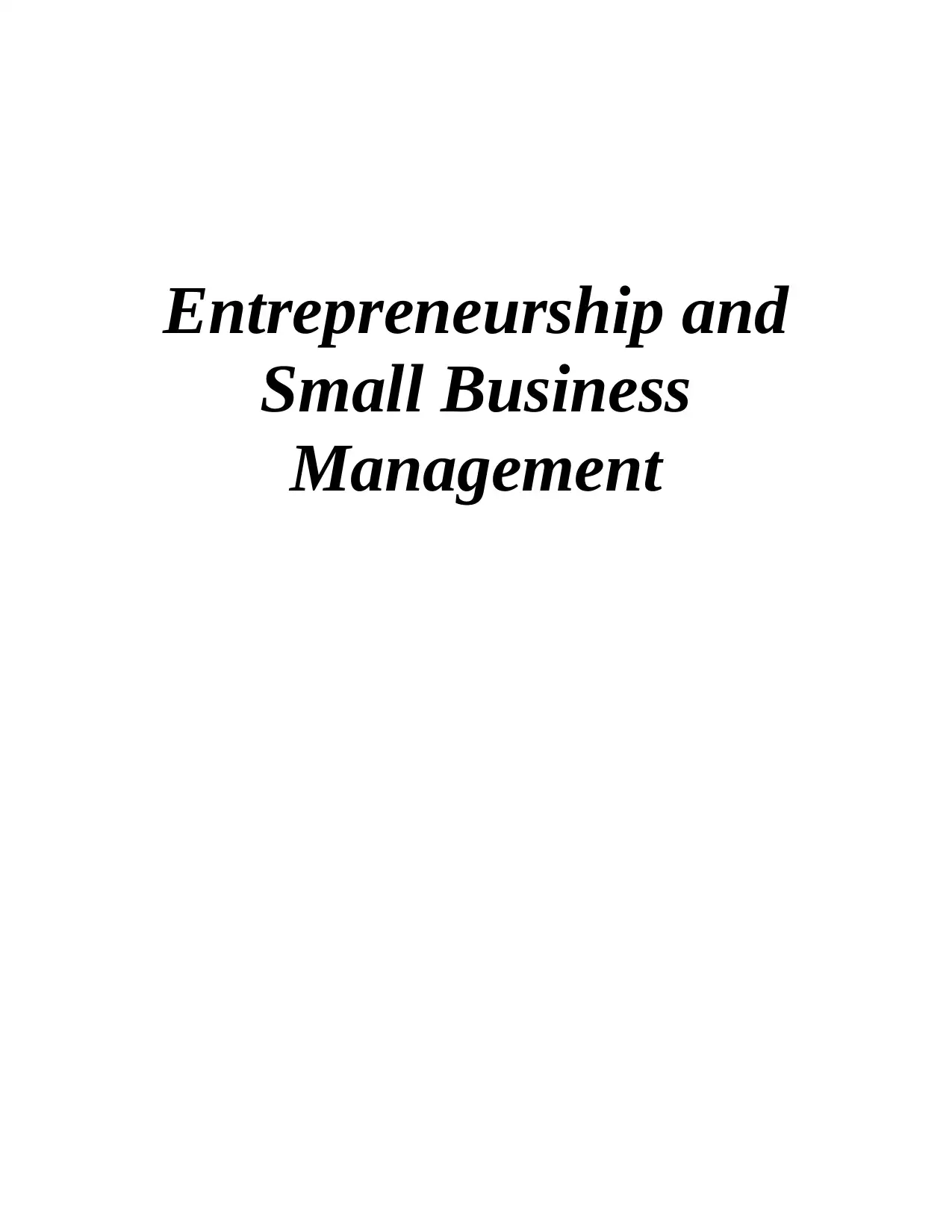
Entrepreneurship and
Small Business
Management
Small Business
Management
Paraphrase This Document
Need a fresh take? Get an instant paraphrase of this document with our AI Paraphraser
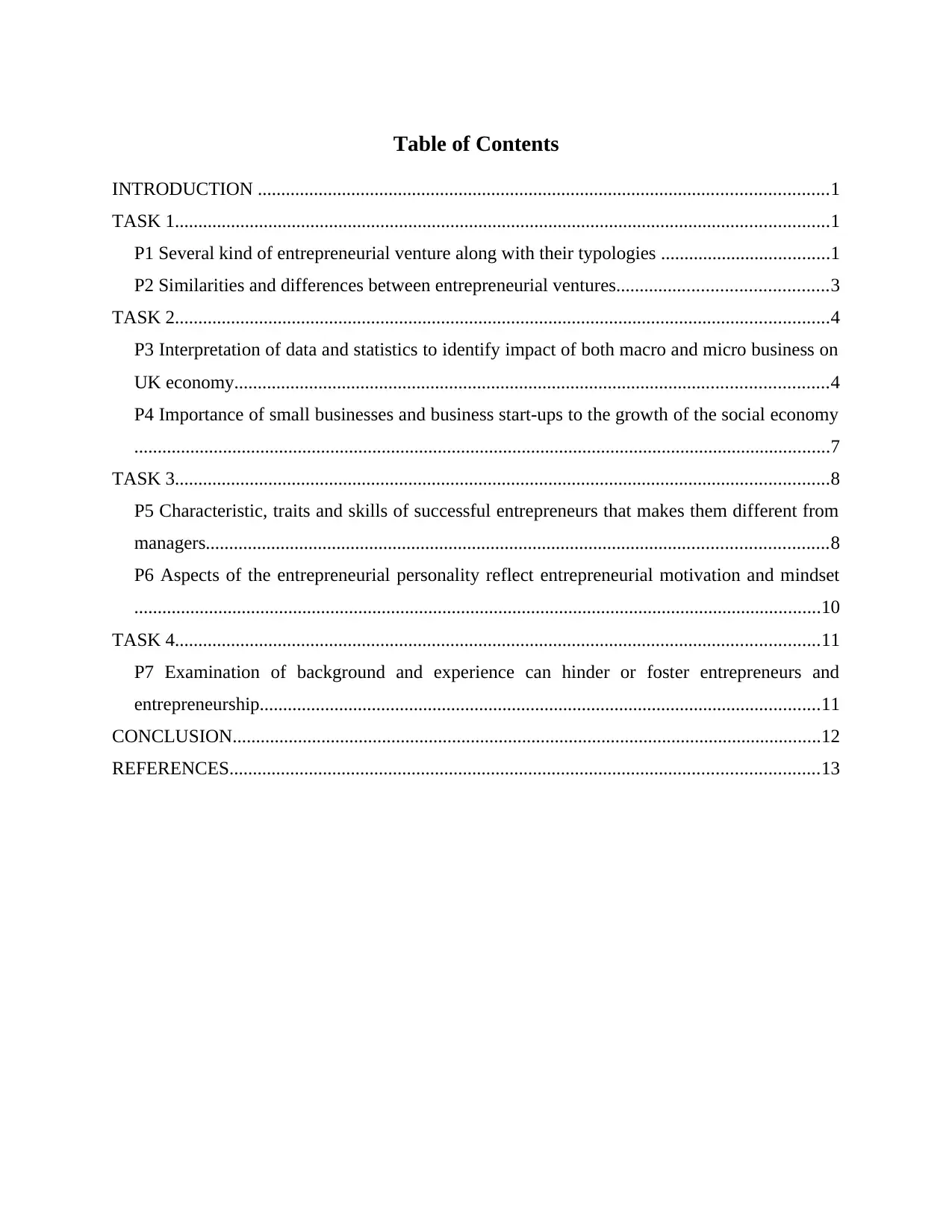
Table of Contents
INTRODUCTION ..........................................................................................................................1
TASK 1............................................................................................................................................1
P1 Several kind of entrepreneurial venture along with their typologies ....................................1
P2 Similarities and differences between entrepreneurial ventures.............................................3
TASK 2............................................................................................................................................4
P3 Interpretation of data and statistics to identify impact of both macro and micro business on
UK economy...............................................................................................................................4
P4 Importance of small businesses and business start-ups to the growth of the social economy
.....................................................................................................................................................7
TASK 3............................................................................................................................................8
P5 Characteristic, traits and skills of successful entrepreneurs that makes them different from
managers.....................................................................................................................................8
P6 Aspects of the entrepreneurial personality reflect entrepreneurial motivation and mindset
...................................................................................................................................................10
TASK 4..........................................................................................................................................11
P7 Examination of background and experience can hinder or foster entrepreneurs and
entrepreneurship........................................................................................................................11
CONCLUSION..............................................................................................................................12
REFERENCES..............................................................................................................................13
INTRODUCTION ..........................................................................................................................1
TASK 1............................................................................................................................................1
P1 Several kind of entrepreneurial venture along with their typologies ....................................1
P2 Similarities and differences between entrepreneurial ventures.............................................3
TASK 2............................................................................................................................................4
P3 Interpretation of data and statistics to identify impact of both macro and micro business on
UK economy...............................................................................................................................4
P4 Importance of small businesses and business start-ups to the growth of the social economy
.....................................................................................................................................................7
TASK 3............................................................................................................................................8
P5 Characteristic, traits and skills of successful entrepreneurs that makes them different from
managers.....................................................................................................................................8
P6 Aspects of the entrepreneurial personality reflect entrepreneurial motivation and mindset
...................................................................................................................................................10
TASK 4..........................................................................................................................................11
P7 Examination of background and experience can hinder or foster entrepreneurs and
entrepreneurship........................................................................................................................11
CONCLUSION..............................................................................................................................12
REFERENCES..............................................................................................................................13
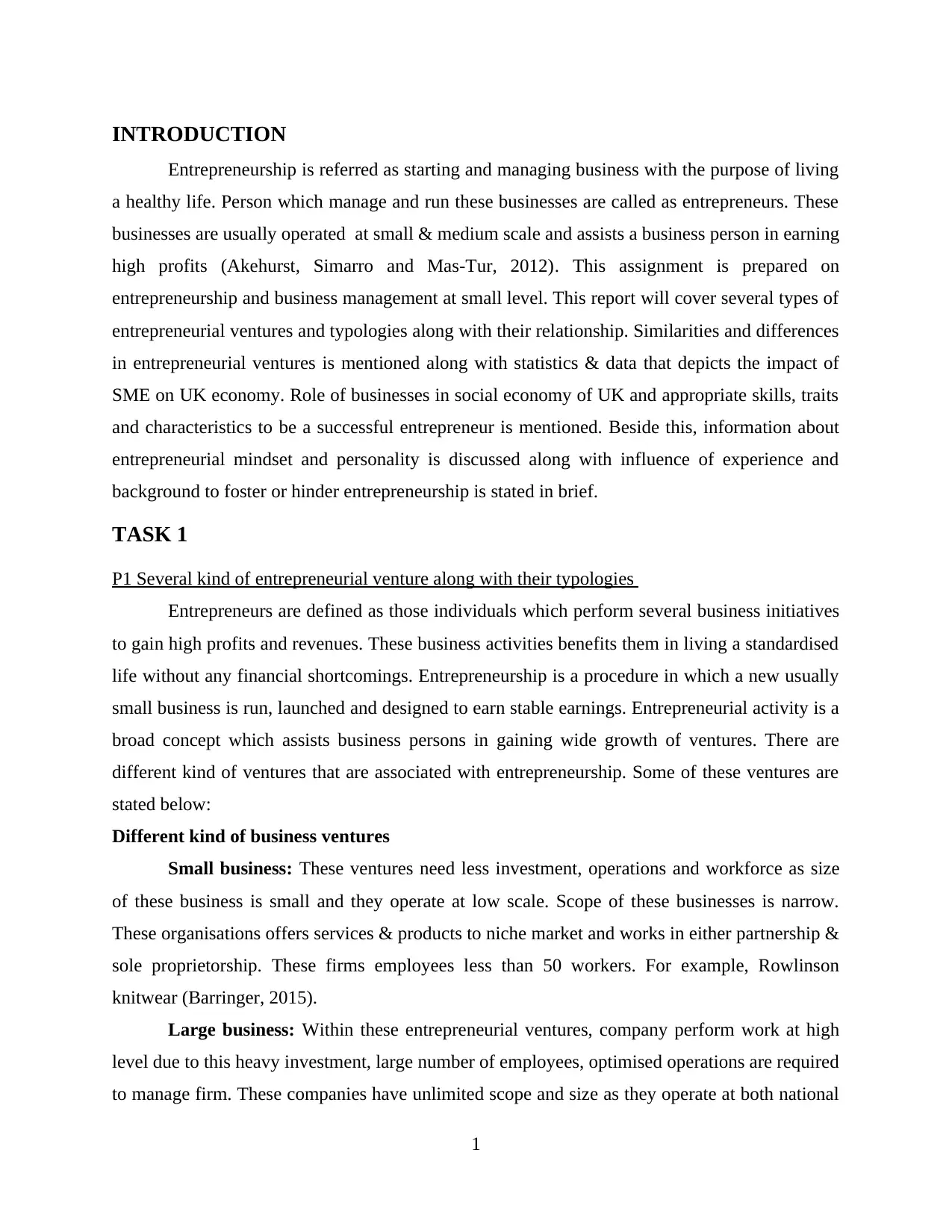
INTRODUCTION
Entrepreneurship is referred as starting and managing business with the purpose of living
a healthy life. Person which manage and run these businesses are called as entrepreneurs. These
businesses are usually operated at small & medium scale and assists a business person in earning
high profits (Akehurst, Simarro and Mas‐Tur, 2012). This assignment is prepared on
entrepreneurship and business management at small level. This report will cover several types of
entrepreneurial ventures and typologies along with their relationship. Similarities and differences
in entrepreneurial ventures is mentioned along with statistics & data that depicts the impact of
SME on UK economy. Role of businesses in social economy of UK and appropriate skills, traits
and characteristics to be a successful entrepreneur is mentioned. Beside this, information about
entrepreneurial mindset and personality is discussed along with influence of experience and
background to foster or hinder entrepreneurship is stated in brief.
TASK 1
P1 Several kind of entrepreneurial venture along with their typologies
Entrepreneurs are defined as those individuals which perform several business initiatives
to gain high profits and revenues. These business activities benefits them in living a standardised
life without any financial shortcomings. Entrepreneurship is a procedure in which a new usually
small business is run, launched and designed to earn stable earnings. Entrepreneurial activity is a
broad concept which assists business persons in gaining wide growth of ventures. There are
different kind of ventures that are associated with entrepreneurship. Some of these ventures are
stated below:
Different kind of business ventures
Small business: These ventures need less investment, operations and workforce as size
of these business is small and they operate at low scale. Scope of these businesses is narrow.
These organisations offers services & products to niche market and works in either partnership &
sole proprietorship. These firms employees less than 50 workers. For example, Rowlinson
knitwear (Barringer, 2015).
Large business: Within these entrepreneurial ventures, company perform work at high
level due to this heavy investment, large number of employees, optimised operations are required
to manage firm. These companies have unlimited scope and size as they operate at both national
1
Entrepreneurship is referred as starting and managing business with the purpose of living
a healthy life. Person which manage and run these businesses are called as entrepreneurs. These
businesses are usually operated at small & medium scale and assists a business person in earning
high profits (Akehurst, Simarro and Mas‐Tur, 2012). This assignment is prepared on
entrepreneurship and business management at small level. This report will cover several types of
entrepreneurial ventures and typologies along with their relationship. Similarities and differences
in entrepreneurial ventures is mentioned along with statistics & data that depicts the impact of
SME on UK economy. Role of businesses in social economy of UK and appropriate skills, traits
and characteristics to be a successful entrepreneur is mentioned. Beside this, information about
entrepreneurial mindset and personality is discussed along with influence of experience and
background to foster or hinder entrepreneurship is stated in brief.
TASK 1
P1 Several kind of entrepreneurial venture along with their typologies
Entrepreneurs are defined as those individuals which perform several business initiatives
to gain high profits and revenues. These business activities benefits them in living a standardised
life without any financial shortcomings. Entrepreneurship is a procedure in which a new usually
small business is run, launched and designed to earn stable earnings. Entrepreneurial activity is a
broad concept which assists business persons in gaining wide growth of ventures. There are
different kind of ventures that are associated with entrepreneurship. Some of these ventures are
stated below:
Different kind of business ventures
Small business: These ventures need less investment, operations and workforce as size
of these business is small and they operate at low scale. Scope of these businesses is narrow.
These organisations offers services & products to niche market and works in either partnership &
sole proprietorship. These firms employees less than 50 workers. For example, Rowlinson
knitwear (Barringer, 2015).
Large business: Within these entrepreneurial ventures, company perform work at high
level due to this heavy investment, large number of employees, optimised operations are required
to manage firm. These companies have unlimited scope and size as they operate at both national
1
⊘ This is a preview!⊘
Do you want full access?
Subscribe today to unlock all pages.

Trusted by 1+ million students worldwide
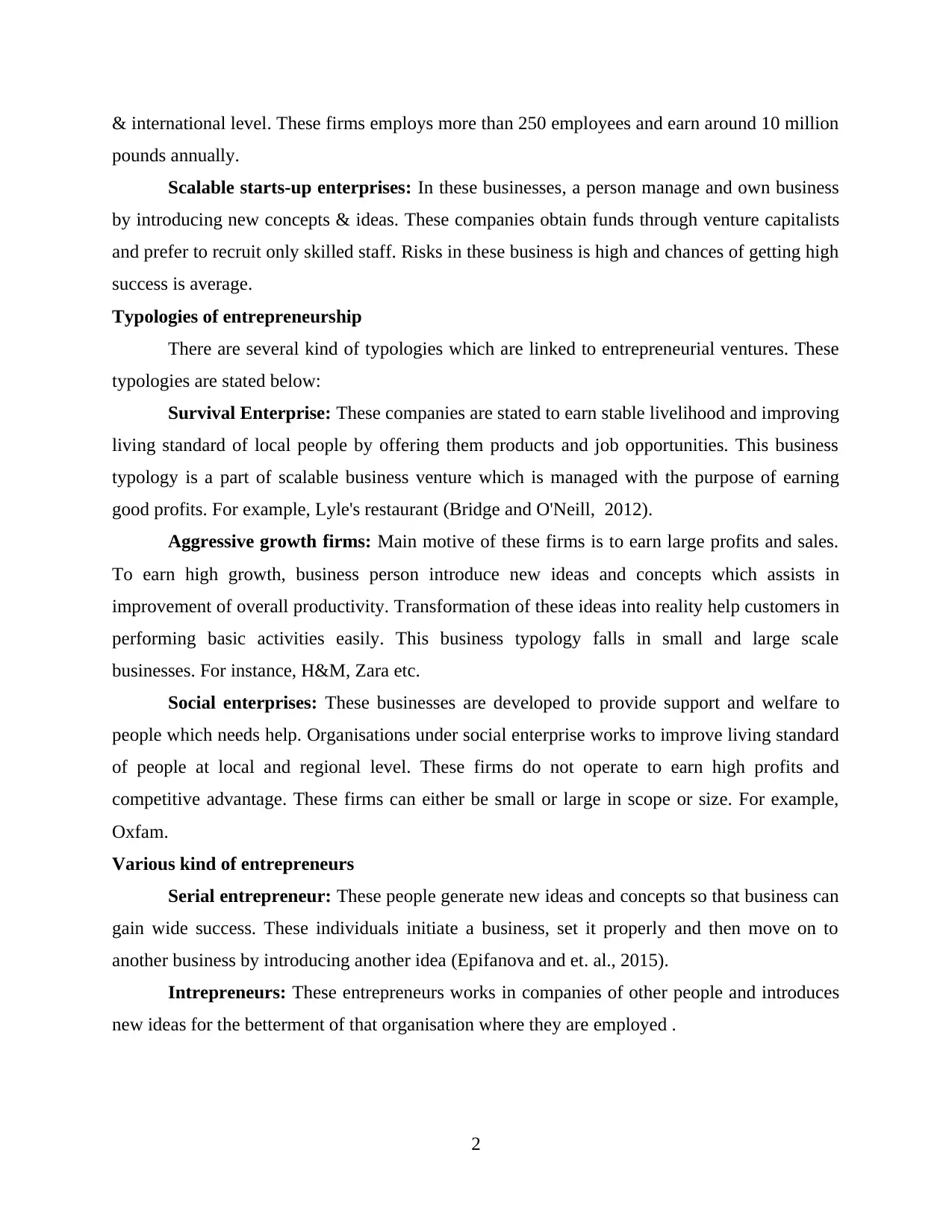
& international level. These firms employs more than 250 employees and earn around 10 million
pounds annually.
Scalable starts-up enterprises: In these businesses, a person manage and own business
by introducing new concepts & ideas. These companies obtain funds through venture capitalists
and prefer to recruit only skilled staff. Risks in these business is high and chances of getting high
success is average.
Typologies of entrepreneurship
There are several kind of typologies which are linked to entrepreneurial ventures. These
typologies are stated below:
Survival Enterprise: These companies are stated to earn stable livelihood and improving
living standard of local people by offering them products and job opportunities. This business
typology is a part of scalable business venture which is managed with the purpose of earning
good profits. For example, Lyle's restaurant (Bridge and O'Neill, 2012).
Aggressive growth firms: Main motive of these firms is to earn large profits and sales.
To earn high growth, business person introduce new ideas and concepts which assists in
improvement of overall productivity. Transformation of these ideas into reality help customers in
performing basic activities easily. This business typology falls in small and large scale
businesses. For instance, H&M, Zara etc.
Social enterprises: These businesses are developed to provide support and welfare to
people which needs help. Organisations under social enterprise works to improve living standard
of people at local and regional level. These firms do not operate to earn high profits and
competitive advantage. These firms can either be small or large in scope or size. For example,
Oxfam.
Various kind of entrepreneurs
Serial entrepreneur: These people generate new ideas and concepts so that business can
gain wide success. These individuals initiate a business, set it properly and then move on to
another business by introducing another idea (Epifanova and et. al., 2015).
Intrepreneurs: These entrepreneurs works in companies of other people and introduces
new ideas for the betterment of that organisation where they are employed .
2
pounds annually.
Scalable starts-up enterprises: In these businesses, a person manage and own business
by introducing new concepts & ideas. These companies obtain funds through venture capitalists
and prefer to recruit only skilled staff. Risks in these business is high and chances of getting high
success is average.
Typologies of entrepreneurship
There are several kind of typologies which are linked to entrepreneurial ventures. These
typologies are stated below:
Survival Enterprise: These companies are stated to earn stable livelihood and improving
living standard of local people by offering them products and job opportunities. This business
typology is a part of scalable business venture which is managed with the purpose of earning
good profits. For example, Lyle's restaurant (Bridge and O'Neill, 2012).
Aggressive growth firms: Main motive of these firms is to earn large profits and sales.
To earn high growth, business person introduce new ideas and concepts which assists in
improvement of overall productivity. Transformation of these ideas into reality help customers in
performing basic activities easily. This business typology falls in small and large scale
businesses. For instance, H&M, Zara etc.
Social enterprises: These businesses are developed to provide support and welfare to
people which needs help. Organisations under social enterprise works to improve living standard
of people at local and regional level. These firms do not operate to earn high profits and
competitive advantage. These firms can either be small or large in scope or size. For example,
Oxfam.
Various kind of entrepreneurs
Serial entrepreneur: These people generate new ideas and concepts so that business can
gain wide success. These individuals initiate a business, set it properly and then move on to
another business by introducing another idea (Epifanova and et. al., 2015).
Intrepreneurs: These entrepreneurs works in companies of other people and introduces
new ideas for the betterment of that organisation where they are employed .
2
Paraphrase This Document
Need a fresh take? Get an instant paraphrase of this document with our AI Paraphraser
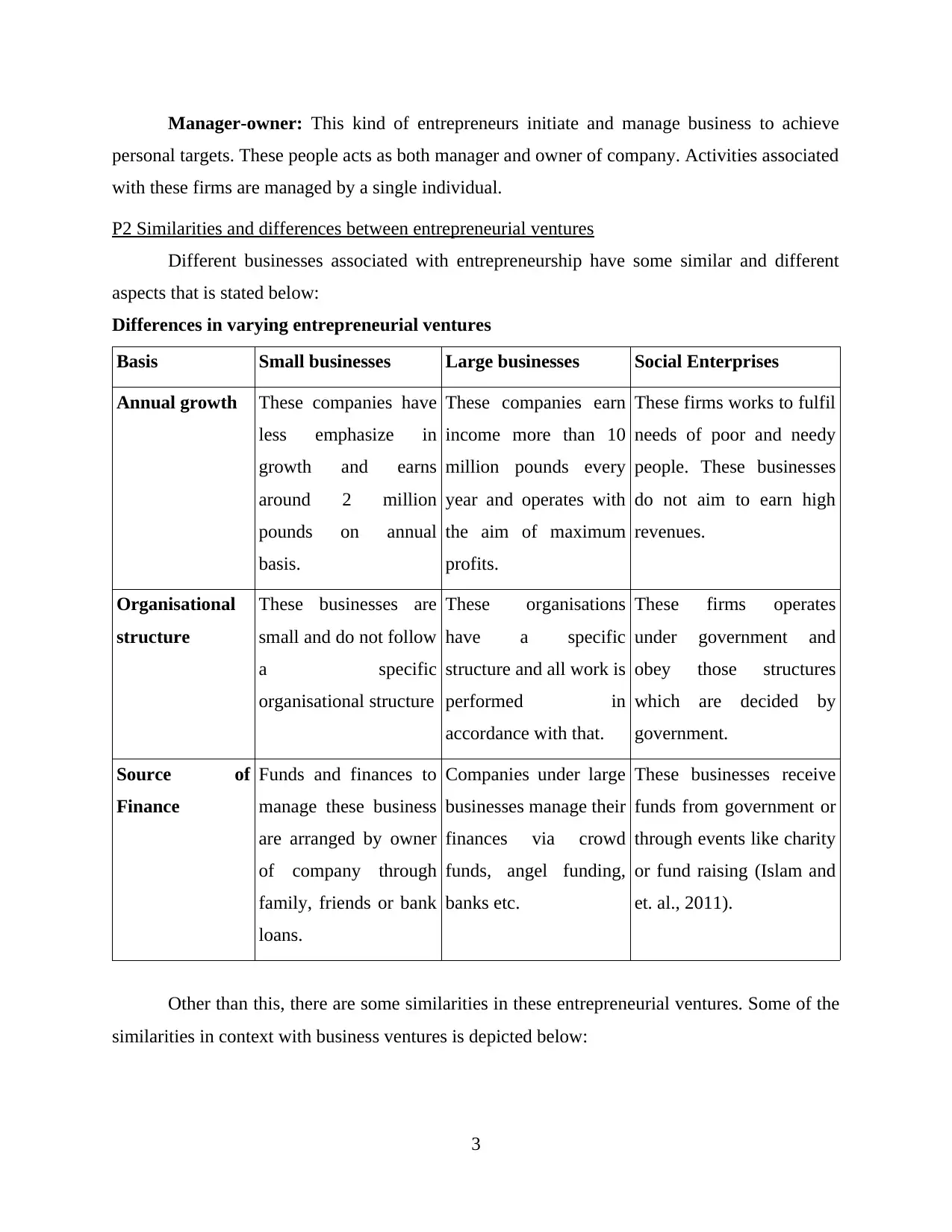
Manager-owner: This kind of entrepreneurs initiate and manage business to achieve
personal targets. These people acts as both manager and owner of company. Activities associated
with these firms are managed by a single individual.
P2 Similarities and differences between entrepreneurial ventures
Different businesses associated with entrepreneurship have some similar and different
aspects that is stated below:
Differences in varying entrepreneurial ventures
Basis Small businesses Large businesses Social Enterprises
Annual growth These companies have
less emphasize in
growth and earns
around 2 million
pounds on annual
basis.
These companies earn
income more than 10
million pounds every
year and operates with
the aim of maximum
profits.
These firms works to fulfil
needs of poor and needy
people. These businesses
do not aim to earn high
revenues.
Organisational
structure
These businesses are
small and do not follow
a specific
organisational structure
These organisations
have a specific
structure and all work is
performed in
accordance with that.
These firms operates
under government and
obey those structures
which are decided by
government.
Source of
Finance
Funds and finances to
manage these business
are arranged by owner
of company through
family, friends or bank
loans.
Companies under large
businesses manage their
finances via crowd
funds, angel funding,
banks etc.
These businesses receive
funds from government or
through events like charity
or fund raising (Islam and
et. al., 2011).
Other than this, there are some similarities in these entrepreneurial ventures. Some of the
similarities in context with business ventures is depicted below:
3
personal targets. These people acts as both manager and owner of company. Activities associated
with these firms are managed by a single individual.
P2 Similarities and differences between entrepreneurial ventures
Different businesses associated with entrepreneurship have some similar and different
aspects that is stated below:
Differences in varying entrepreneurial ventures
Basis Small businesses Large businesses Social Enterprises
Annual growth These companies have
less emphasize in
growth and earns
around 2 million
pounds on annual
basis.
These companies earn
income more than 10
million pounds every
year and operates with
the aim of maximum
profits.
These firms works to fulfil
needs of poor and needy
people. These businesses
do not aim to earn high
revenues.
Organisational
structure
These businesses are
small and do not follow
a specific
organisational structure
These organisations
have a specific
structure and all work is
performed in
accordance with that.
These firms operates
under government and
obey those structures
which are decided by
government.
Source of
Finance
Funds and finances to
manage these business
are arranged by owner
of company through
family, friends or bank
loans.
Companies under large
businesses manage their
finances via crowd
funds, angel funding,
banks etc.
These businesses receive
funds from government or
through events like charity
or fund raising (Islam and
et. al., 2011).
Other than this, there are some similarities in these entrepreneurial ventures. Some of the
similarities in context with business ventures is depicted below:
3
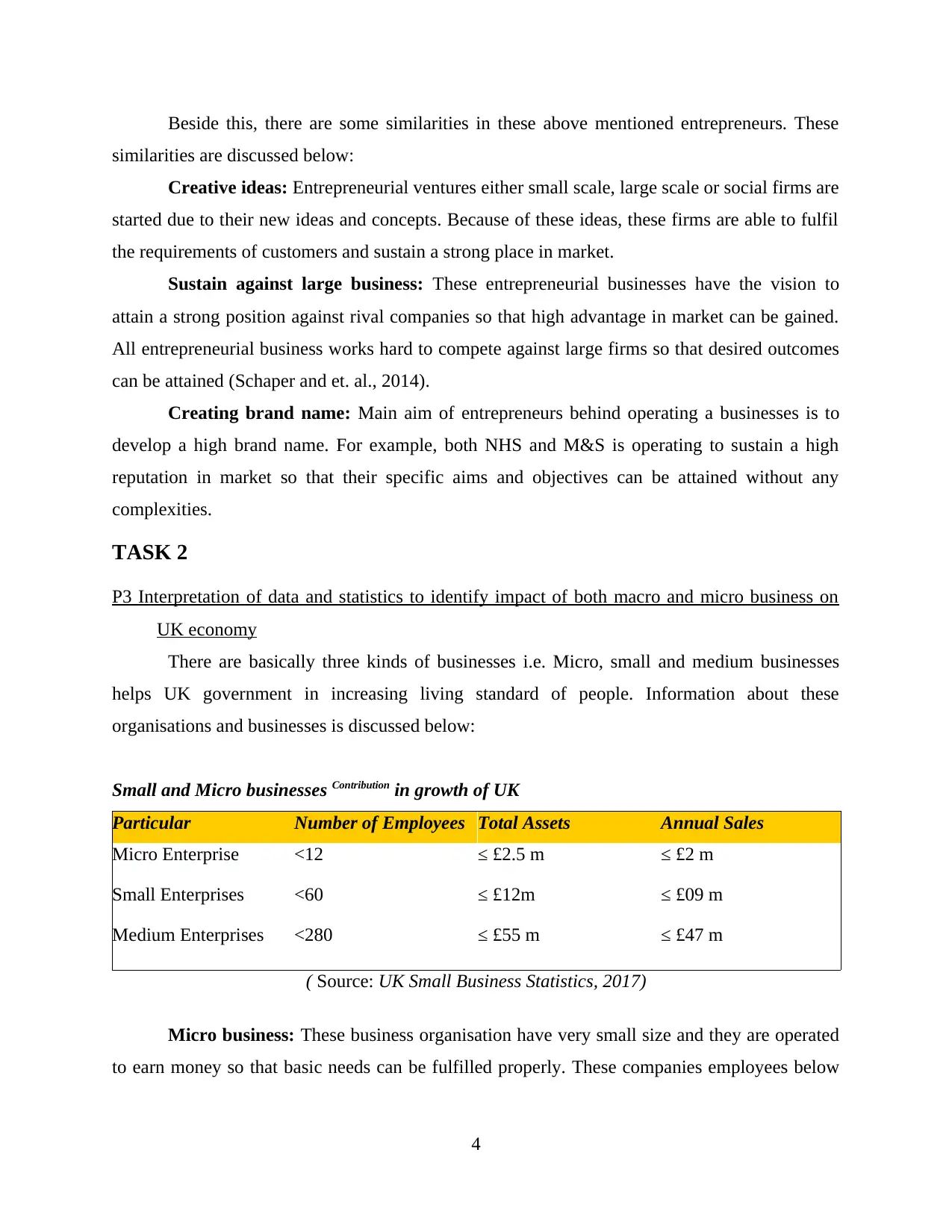
Beside this, there are some similarities in these above mentioned entrepreneurs. These
similarities are discussed below:
Creative ideas: Entrepreneurial ventures either small scale, large scale or social firms are
started due to their new ideas and concepts. Because of these ideas, these firms are able to fulfil
the requirements of customers and sustain a strong place in market.
Sustain against large business: These entrepreneurial businesses have the vision to
attain a strong position against rival companies so that high advantage in market can be gained.
All entrepreneurial business works hard to compete against large firms so that desired outcomes
can be attained (Schaper and et. al., 2014).
Creating brand name: Main aim of entrepreneurs behind operating a businesses is to
develop a high brand name. For example, both NHS and M&S is operating to sustain a high
reputation in market so that their specific aims and objectives can be attained without any
complexities.
TASK 2
P3 Interpretation of data and statistics to identify impact of both macro and micro business on
UK economy
There are basically three kinds of businesses i.e. Micro, small and medium businesses
helps UK government in increasing living standard of people. Information about these
organisations and businesses is discussed below:
Small and Micro businesses Contribution in growth of UK
Particular Number of Employees Total Assets Annual Sales
Micro Enterprise <12 ≤ £2.5 m ≤ £2 m
Small Enterprises <60 ≤ £12m ≤ £09 m
Medium Enterprises <280 ≤ £55 m ≤ £47 m
( Source: UK Small Business Statistics, 2017)
Micro business: These business organisation have very small size and they are operated
to earn money so that basic needs can be fulfilled properly. These companies employees below
4
similarities are discussed below:
Creative ideas: Entrepreneurial ventures either small scale, large scale or social firms are
started due to their new ideas and concepts. Because of these ideas, these firms are able to fulfil
the requirements of customers and sustain a strong place in market.
Sustain against large business: These entrepreneurial businesses have the vision to
attain a strong position against rival companies so that high advantage in market can be gained.
All entrepreneurial business works hard to compete against large firms so that desired outcomes
can be attained (Schaper and et. al., 2014).
Creating brand name: Main aim of entrepreneurs behind operating a businesses is to
develop a high brand name. For example, both NHS and M&S is operating to sustain a high
reputation in market so that their specific aims and objectives can be attained without any
complexities.
TASK 2
P3 Interpretation of data and statistics to identify impact of both macro and micro business on
UK economy
There are basically three kinds of businesses i.e. Micro, small and medium businesses
helps UK government in increasing living standard of people. Information about these
organisations and businesses is discussed below:
Small and Micro businesses Contribution in growth of UK
Particular Number of Employees Total Assets Annual Sales
Micro Enterprise <12 ≤ £2.5 m ≤ £2 m
Small Enterprises <60 ≤ £12m ≤ £09 m
Medium Enterprises <280 ≤ £55 m ≤ £47 m
( Source: UK Small Business Statistics, 2017)
Micro business: These business organisation have very small size and they are operated
to earn money so that basic needs can be fulfilled properly. These companies employees below
4
⊘ This is a preview!⊘
Do you want full access?
Subscribe today to unlock all pages.

Trusted by 1+ million students worldwide
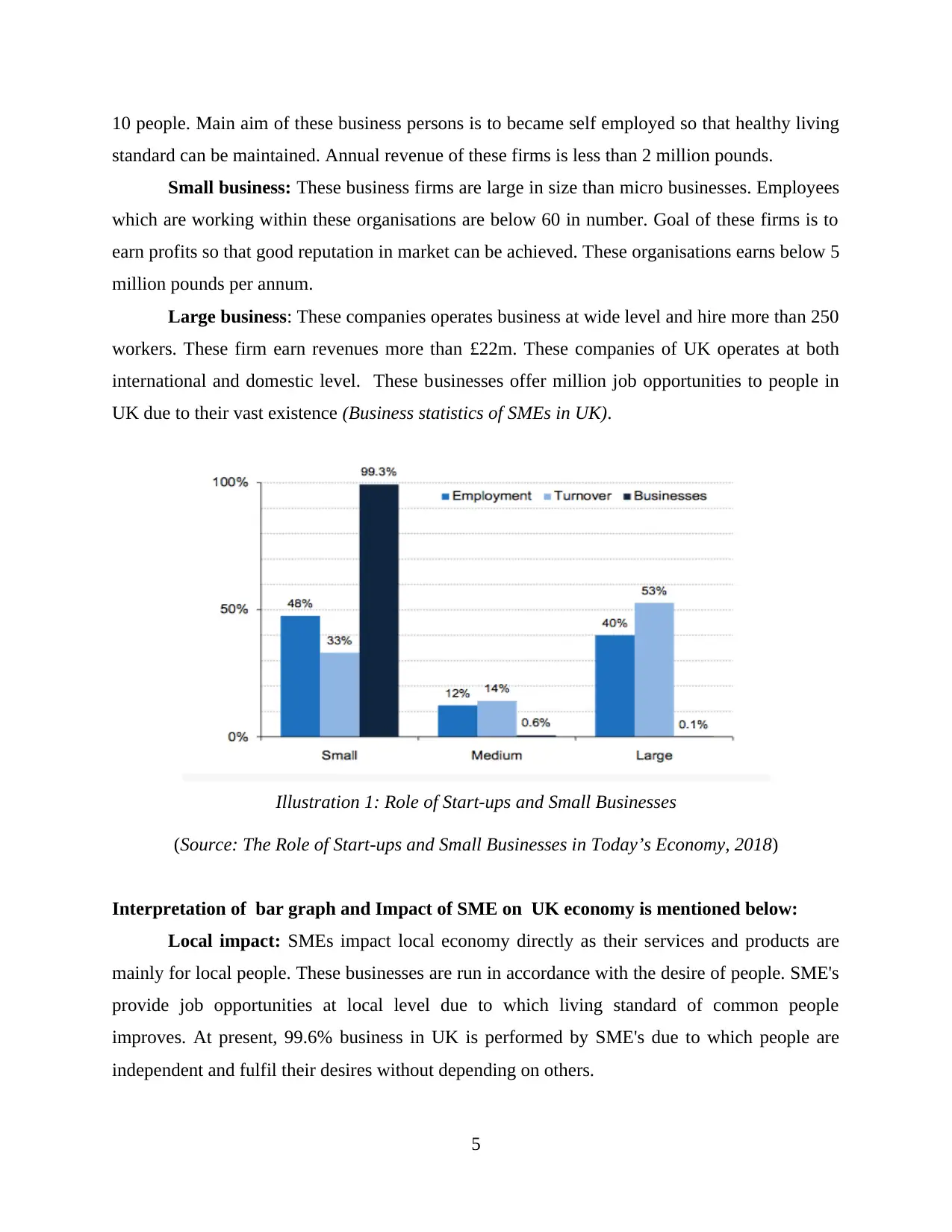
10 people. Main aim of these business persons is to became self employed so that healthy living
standard can be maintained. Annual revenue of these firms is less than 2 million pounds.
Small business: These business firms are large in size than micro businesses. Employees
which are working within these organisations are below 60 in number. Goal of these firms is to
earn profits so that good reputation in market can be achieved. These organisations earns below 5
million pounds per annum.
Large business: These companies operates business at wide level and hire more than 250
workers. These firm earn revenues more than £22m. These companies of UK operates at both
international and domestic level. These businesses offer million job opportunities to people in
UK due to their vast existence (Business statistics of SMEs in UK).
(Source: The Role of Start-ups and Small Businesses in Today’s Economy, 2018)
Interpretation of bar graph and Impact of SME on UK economy is mentioned below:
Local impact: SMEs impact local economy directly as their services and products are
mainly for local people. These businesses are run in accordance with the desire of people. SME's
provide job opportunities at local level due to which living standard of common people
improves. At present, 99.6% business in UK is performed by SME's due to which people are
independent and fulfil their desires without depending on others.
5
Illustration 1: Role of Start-ups and Small Businesses
standard can be maintained. Annual revenue of these firms is less than 2 million pounds.
Small business: These business firms are large in size than micro businesses. Employees
which are working within these organisations are below 60 in number. Goal of these firms is to
earn profits so that good reputation in market can be achieved. These organisations earns below 5
million pounds per annum.
Large business: These companies operates business at wide level and hire more than 250
workers. These firm earn revenues more than £22m. These companies of UK operates at both
international and domestic level. These businesses offer million job opportunities to people in
UK due to their vast existence (Business statistics of SMEs in UK).
(Source: The Role of Start-ups and Small Businesses in Today’s Economy, 2018)
Interpretation of bar graph and Impact of SME on UK economy is mentioned below:
Local impact: SMEs impact local economy directly as their services and products are
mainly for local people. These businesses are run in accordance with the desire of people. SME's
provide job opportunities at local level due to which living standard of common people
improves. At present, 99.6% business in UK is performed by SME's due to which people are
independent and fulfil their desires without depending on others.
5
Illustration 1: Role of Start-ups and Small Businesses
Paraphrase This Document
Need a fresh take? Get an instant paraphrase of this document with our AI Paraphraser
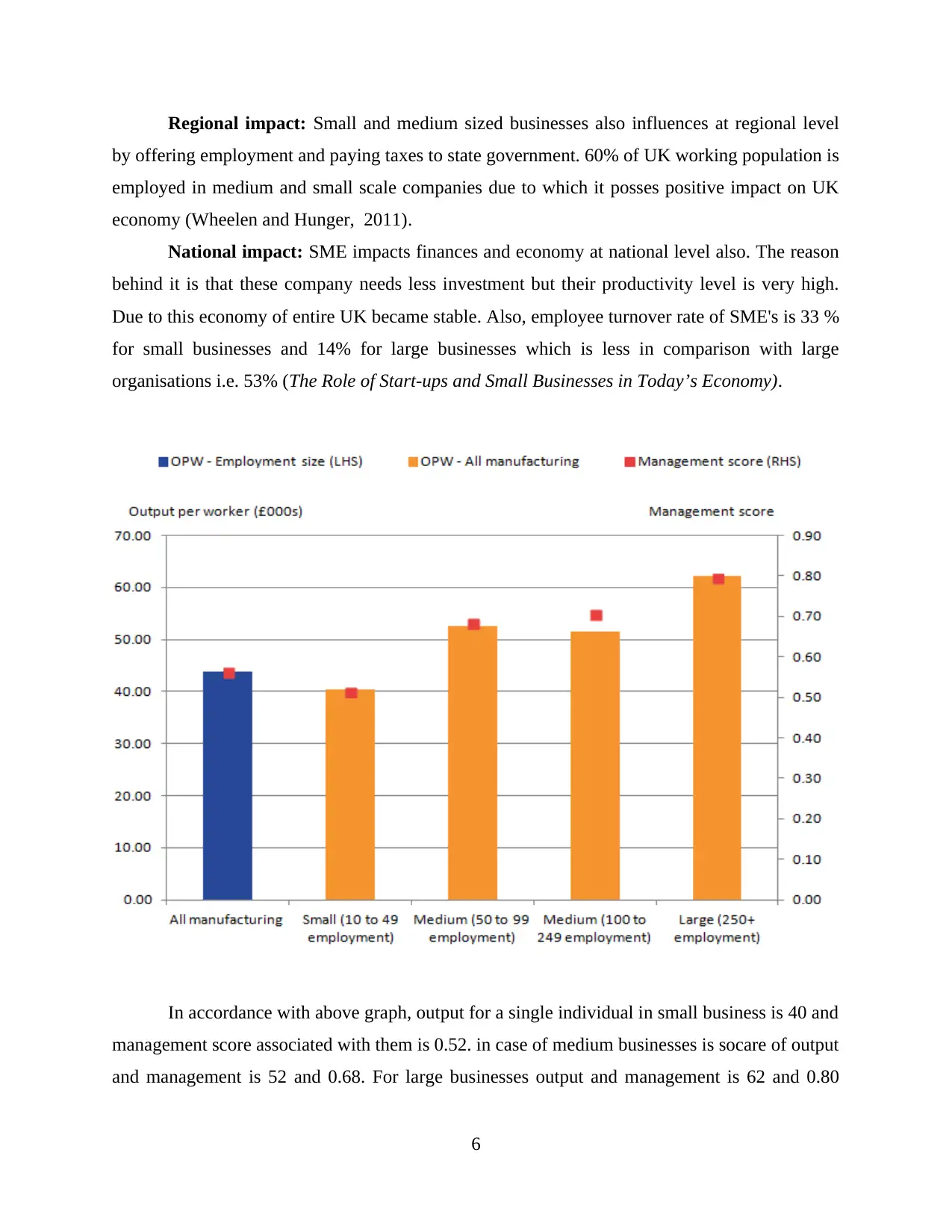
Regional impact: Small and medium sized businesses also influences at regional level
by offering employment and paying taxes to state government. 60% of UK working population is
employed in medium and small scale companies due to which it posses positive impact on UK
economy (Wheelen and Hunger, 2011).
National impact: SME impacts finances and economy at national level also. The reason
behind it is that these company needs less investment but their productivity level is very high.
Due to this economy of entire UK became stable. Also, employee turnover rate of SME's is 33 %
for small businesses and 14% for large businesses which is less in comparison with large
organisations i.e. 53% (The Role of Start-ups and Small Businesses in Today’s Economy).
In accordance with above graph, output for a single individual in small business is 40 and
management score associated with them is 0.52. in case of medium businesses is socare of output
and management is 52 and 0.68. For large businesses output and management is 62 and 0.80
6
by offering employment and paying taxes to state government. 60% of UK working population is
employed in medium and small scale companies due to which it posses positive impact on UK
economy (Wheelen and Hunger, 2011).
National impact: SME impacts finances and economy at national level also. The reason
behind it is that these company needs less investment but their productivity level is very high.
Due to this economy of entire UK became stable. Also, employee turnover rate of SME's is 33 %
for small businesses and 14% for large businesses which is less in comparison with large
organisations i.e. 53% (The Role of Start-ups and Small Businesses in Today’s Economy).
In accordance with above graph, output for a single individual in small business is 40 and
management score associated with them is 0.52. in case of medium businesses is socare of output
and management is 52 and 0.68. For large businesses output and management is 62 and 0.80
6
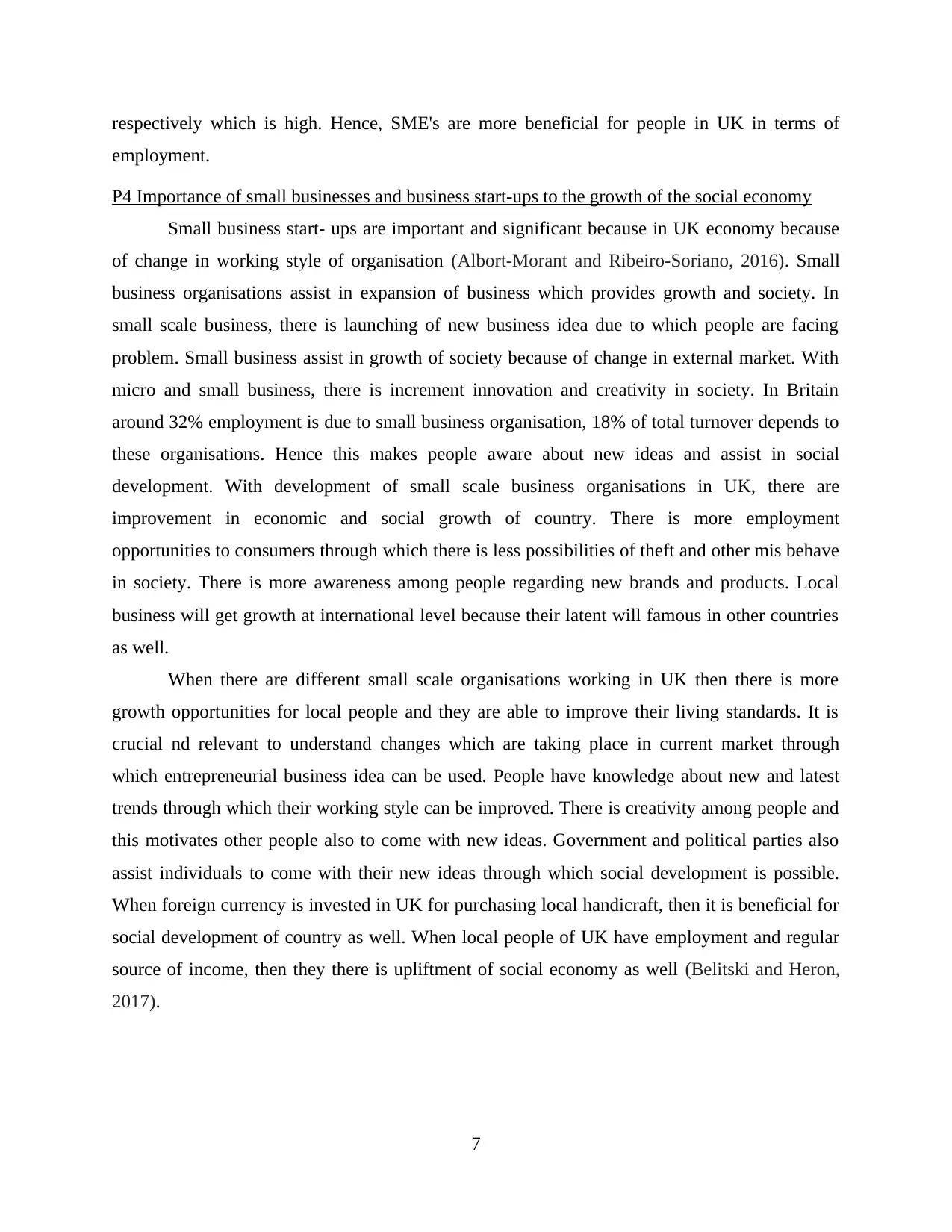
respectively which is high. Hence, SME's are more beneficial for people in UK in terms of
employment.
P4 Importance of small businesses and business start-ups to the growth of the social economy
Small business start- ups are important and significant because in UK economy because
of change in working style of organisation (Albort-Morant and Ribeiro-Soriano, 2016). Small
business organisations assist in expansion of business which provides growth and society. In
small scale business, there is launching of new business idea due to which people are facing
problem. Small business assist in growth of society because of change in external market. With
micro and small business, there is increment innovation and creativity in society. In Britain
around 32% employment is due to small business organisation, 18% of total turnover depends to
these organisations. Hence this makes people aware about new ideas and assist in social
development. With development of small scale business organisations in UK, there are
improvement in economic and social growth of country. There is more employment
opportunities to consumers through which there is less possibilities of theft and other mis behave
in society. There is more awareness among people regarding new brands and products. Local
business will get growth at international level because their latent will famous in other countries
as well.
When there are different small scale organisations working in UK then there is more
growth opportunities for local people and they are able to improve their living standards. It is
crucial nd relevant to understand changes which are taking place in current market through
which entrepreneurial business idea can be used. People have knowledge about new and latest
trends through which their working style can be improved. There is creativity among people and
this motivates other people also to come with new ideas. Government and political parties also
assist individuals to come with their new ideas through which social development is possible.
When foreign currency is invested in UK for purchasing local handicraft, then it is beneficial for
social development of country as well. When local people of UK have employment and regular
source of income, then they there is upliftment of social economy as well (Belitski and Heron,
2017).
7
employment.
P4 Importance of small businesses and business start-ups to the growth of the social economy
Small business start- ups are important and significant because in UK economy because
of change in working style of organisation (Albort-Morant and Ribeiro-Soriano, 2016). Small
business organisations assist in expansion of business which provides growth and society. In
small scale business, there is launching of new business idea due to which people are facing
problem. Small business assist in growth of society because of change in external market. With
micro and small business, there is increment innovation and creativity in society. In Britain
around 32% employment is due to small business organisation, 18% of total turnover depends to
these organisations. Hence this makes people aware about new ideas and assist in social
development. With development of small scale business organisations in UK, there are
improvement in economic and social growth of country. There is more employment
opportunities to consumers through which there is less possibilities of theft and other mis behave
in society. There is more awareness among people regarding new brands and products. Local
business will get growth at international level because their latent will famous in other countries
as well.
When there are different small scale organisations working in UK then there is more
growth opportunities for local people and they are able to improve their living standards. It is
crucial nd relevant to understand changes which are taking place in current market through
which entrepreneurial business idea can be used. People have knowledge about new and latest
trends through which their working style can be improved. There is creativity among people and
this motivates other people also to come with new ideas. Government and political parties also
assist individuals to come with their new ideas through which social development is possible.
When foreign currency is invested in UK for purchasing local handicraft, then it is beneficial for
social development of country as well. When local people of UK have employment and regular
source of income, then they there is upliftment of social economy as well (Belitski and Heron,
2017).
7
⊘ This is a preview!⊘
Do you want full access?
Subscribe today to unlock all pages.

Trusted by 1+ million students worldwide
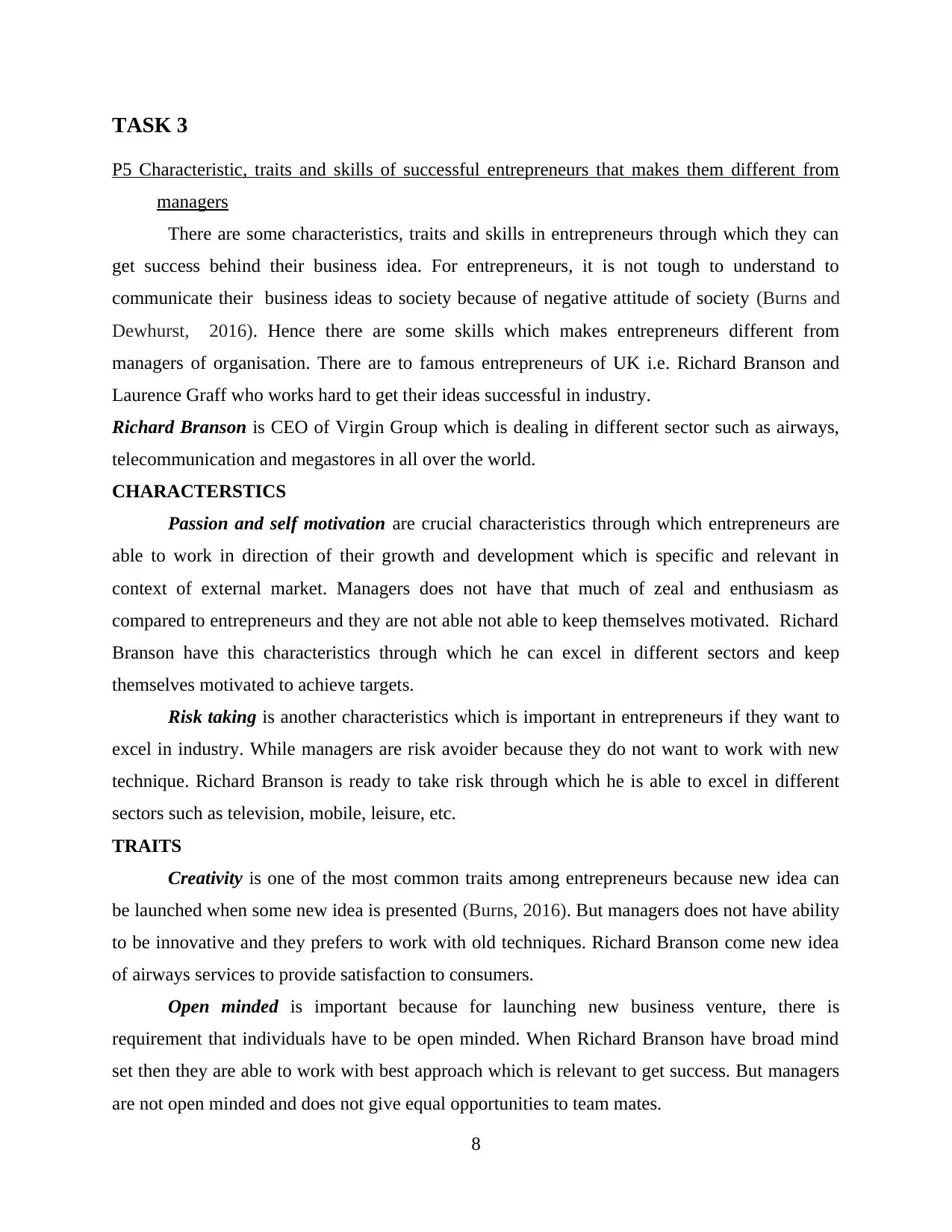
TASK 3
P5 Characteristic, traits and skills of successful entrepreneurs that makes them different from
managers
There are some characteristics, traits and skills in entrepreneurs through which they can
get success behind their business idea. For entrepreneurs, it is not tough to understand to
communicate their business ideas to society because of negative attitude of society (Burns and
Dewhurst, 2016). Hence there are some skills which makes entrepreneurs different from
managers of organisation. There are to famous entrepreneurs of UK i.e. Richard Branson and
Laurence Graff who works hard to get their ideas successful in industry.
Richard Branson is CEO of Virgin Group which is dealing in different sector such as airways,
telecommunication and megastores in all over the world.
CHARACTERSTICS
Passion and self motivation are crucial characteristics through which entrepreneurs are
able to work in direction of their growth and development which is specific and relevant in
context of external market. Managers does not have that much of zeal and enthusiasm as
compared to entrepreneurs and they are not able not able to keep themselves motivated. Richard
Branson have this characteristics through which he can excel in different sectors and keep
themselves motivated to achieve targets.
Risk taking is another characteristics which is important in entrepreneurs if they want to
excel in industry. While managers are risk avoider because they do not want to work with new
technique. Richard Branson is ready to take risk through which he is able to excel in different
sectors such as television, mobile, leisure, etc.
TRAITS
Creativity is one of the most common traits among entrepreneurs because new idea can
be launched when some new idea is presented (Burns, 2016). But managers does not have ability
to be innovative and they prefers to work with old techniques. Richard Branson come new idea
of airways services to provide satisfaction to consumers.
Open minded is important because for launching new business venture, there is
requirement that individuals have to be open minded. When Richard Branson have broad mind
set then they are able to work with best approach which is relevant to get success. But managers
are not open minded and does not give equal opportunities to team mates.
8
P5 Characteristic, traits and skills of successful entrepreneurs that makes them different from
managers
There are some characteristics, traits and skills in entrepreneurs through which they can
get success behind their business idea. For entrepreneurs, it is not tough to understand to
communicate their business ideas to society because of negative attitude of society (Burns and
Dewhurst, 2016). Hence there are some skills which makes entrepreneurs different from
managers of organisation. There are to famous entrepreneurs of UK i.e. Richard Branson and
Laurence Graff who works hard to get their ideas successful in industry.
Richard Branson is CEO of Virgin Group which is dealing in different sector such as airways,
telecommunication and megastores in all over the world.
CHARACTERSTICS
Passion and self motivation are crucial characteristics through which entrepreneurs are
able to work in direction of their growth and development which is specific and relevant in
context of external market. Managers does not have that much of zeal and enthusiasm as
compared to entrepreneurs and they are not able not able to keep themselves motivated. Richard
Branson have this characteristics through which he can excel in different sectors and keep
themselves motivated to achieve targets.
Risk taking is another characteristics which is important in entrepreneurs if they want to
excel in industry. While managers are risk avoider because they do not want to work with new
technique. Richard Branson is ready to take risk through which he is able to excel in different
sectors such as television, mobile, leisure, etc.
TRAITS
Creativity is one of the most common traits among entrepreneurs because new idea can
be launched when some new idea is presented (Burns, 2016). But managers does not have ability
to be innovative and they prefers to work with old techniques. Richard Branson come new idea
of airways services to provide satisfaction to consumers.
Open minded is important because for launching new business venture, there is
requirement that individuals have to be open minded. When Richard Branson have broad mind
set then they are able to work with best approach which is relevant to get success. But managers
are not open minded and does not give equal opportunities to team mates.
8
Paraphrase This Document
Need a fresh take? Get an instant paraphrase of this document with our AI Paraphraser
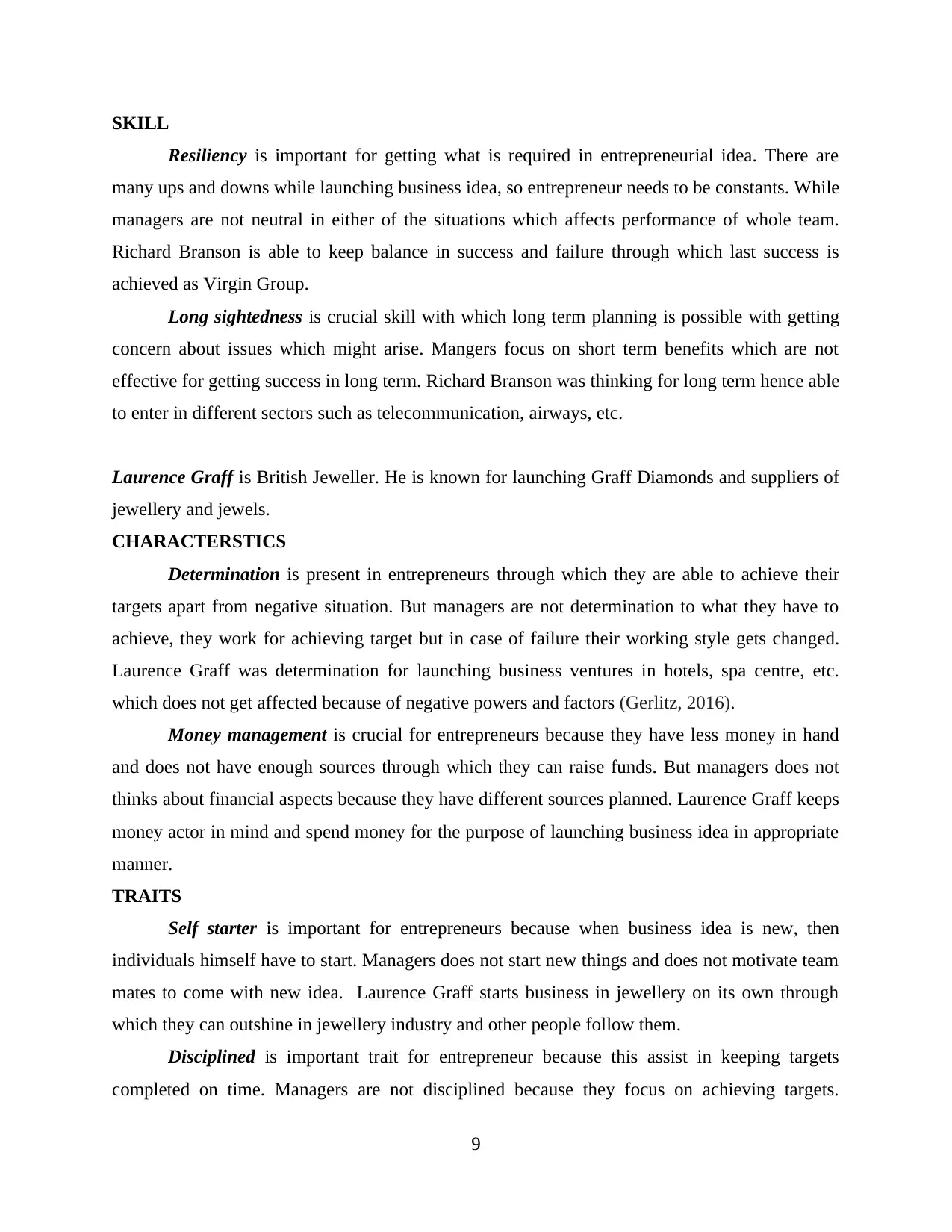
SKILL
Resiliency is important for getting what is required in entrepreneurial idea. There are
many ups and downs while launching business idea, so entrepreneur needs to be constants. While
managers are not neutral in either of the situations which affects performance of whole team.
Richard Branson is able to keep balance in success and failure through which last success is
achieved as Virgin Group.
Long sightedness is crucial skill with which long term planning is possible with getting
concern about issues which might arise. Mangers focus on short term benefits which are not
effective for getting success in long term. Richard Branson was thinking for long term hence able
to enter in different sectors such as telecommunication, airways, etc.
Laurence Graff is British Jeweller. He is known for launching Graff Diamonds and suppliers of
jewellery and jewels.
CHARACTERSTICS
Determination is present in entrepreneurs through which they are able to achieve their
targets apart from negative situation. But managers are not determination to what they have to
achieve, they work for achieving target but in case of failure their working style gets changed.
Laurence Graff was determination for launching business ventures in hotels, spa centre, etc.
which does not get affected because of negative powers and factors (Gerlitz, 2016).
Money management is crucial for entrepreneurs because they have less money in hand
and does not have enough sources through which they can raise funds. But managers does not
thinks about financial aspects because they have different sources planned. Laurence Graff keeps
money actor in mind and spend money for the purpose of launching business idea in appropriate
manner.
TRAITS
Self starter is important for entrepreneurs because when business idea is new, then
individuals himself have to start. Managers does not start new things and does not motivate team
mates to come with new idea. Laurence Graff starts business in jewellery on its own through
which they can outshine in jewellery industry and other people follow them.
Disciplined is important trait for entrepreneur because this assist in keeping targets
completed on time. Managers are not disciplined because they focus on achieving targets.
9
Resiliency is important for getting what is required in entrepreneurial idea. There are
many ups and downs while launching business idea, so entrepreneur needs to be constants. While
managers are not neutral in either of the situations which affects performance of whole team.
Richard Branson is able to keep balance in success and failure through which last success is
achieved as Virgin Group.
Long sightedness is crucial skill with which long term planning is possible with getting
concern about issues which might arise. Mangers focus on short term benefits which are not
effective for getting success in long term. Richard Branson was thinking for long term hence able
to enter in different sectors such as telecommunication, airways, etc.
Laurence Graff is British Jeweller. He is known for launching Graff Diamonds and suppliers of
jewellery and jewels.
CHARACTERSTICS
Determination is present in entrepreneurs through which they are able to achieve their
targets apart from negative situation. But managers are not determination to what they have to
achieve, they work for achieving target but in case of failure their working style gets changed.
Laurence Graff was determination for launching business ventures in hotels, spa centre, etc.
which does not get affected because of negative powers and factors (Gerlitz, 2016).
Money management is crucial for entrepreneurs because they have less money in hand
and does not have enough sources through which they can raise funds. But managers does not
thinks about financial aspects because they have different sources planned. Laurence Graff keeps
money actor in mind and spend money for the purpose of launching business idea in appropriate
manner.
TRAITS
Self starter is important for entrepreneurs because when business idea is new, then
individuals himself have to start. Managers does not start new things and does not motivate team
mates to come with new idea. Laurence Graff starts business in jewellery on its own through
which they can outshine in jewellery industry and other people follow them.
Disciplined is important trait for entrepreneur because this assist in keeping targets
completed on time. Managers are not disciplined because they focus on achieving targets.
9
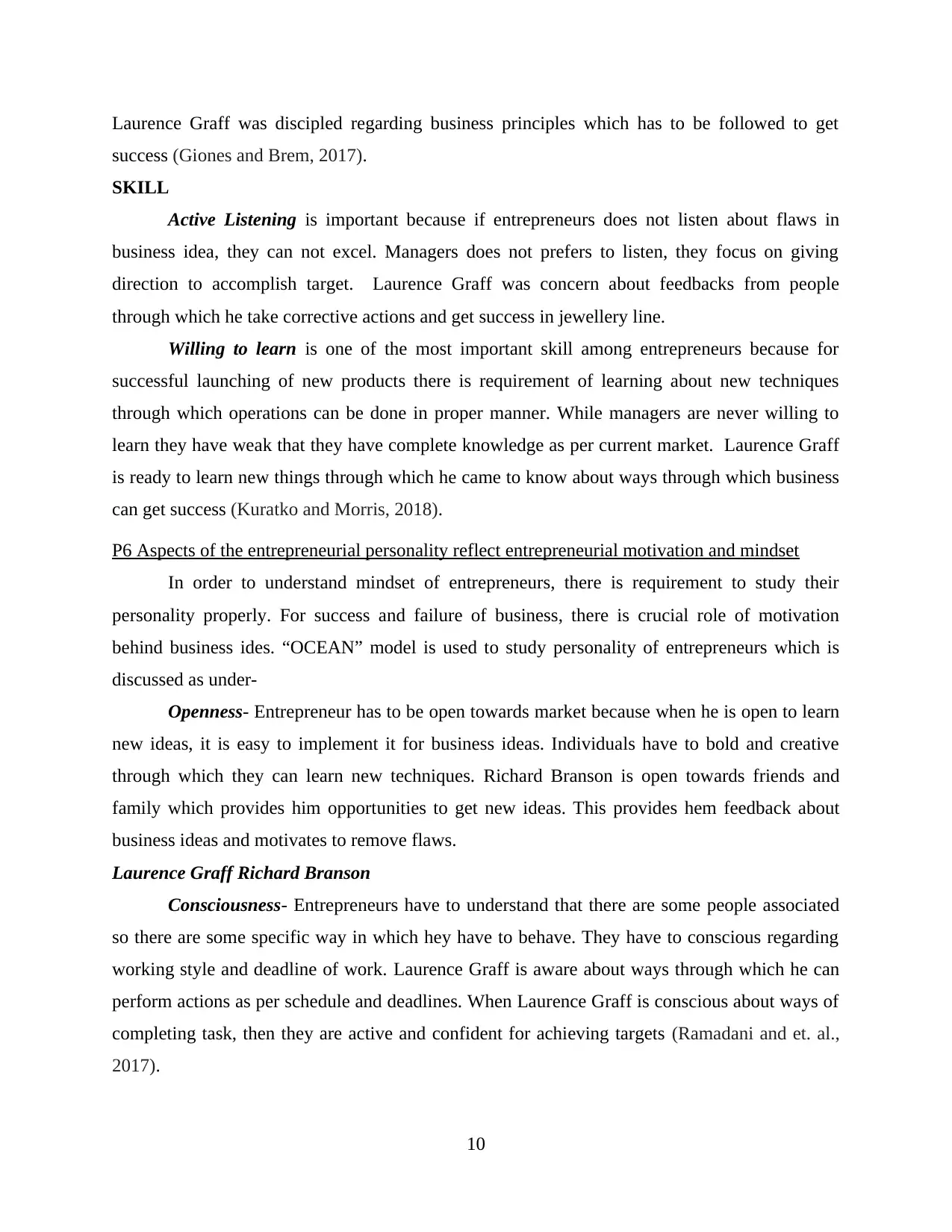
Laurence Graff was discipled regarding business principles which has to be followed to get
success (Giones and Brem, 2017).
SKILL
Active Listening is important because if entrepreneurs does not listen about flaws in
business idea, they can not excel. Managers does not prefers to listen, they focus on giving
direction to accomplish target. Laurence Graff was concern about feedbacks from people
through which he take corrective actions and get success in jewellery line.
Willing to learn is one of the most important skill among entrepreneurs because for
successful launching of new products there is requirement of learning about new techniques
through which operations can be done in proper manner. While managers are never willing to
learn they have weak that they have complete knowledge as per current market. Laurence Graff
is ready to learn new things through which he came to know about ways through which business
can get success (Kuratko and Morris, 2018).
P6 Aspects of the entrepreneurial personality reflect entrepreneurial motivation and mindset
In order to understand mindset of entrepreneurs, there is requirement to study their
personality properly. For success and failure of business, there is crucial role of motivation
behind business ides. “OCEAN” model is used to study personality of entrepreneurs which is
discussed as under-
Openness- Entrepreneur has to be open towards market because when he is open to learn
new ideas, it is easy to implement it for business ideas. Individuals have to bold and creative
through which they can learn new techniques. Richard Branson is open towards friends and
family which provides him opportunities to get new ideas. This provides hem feedback about
business ideas and motivates to remove flaws.
Laurence Graff Richard Branson
Consciousness- Entrepreneurs have to understand that there are some people associated
so there are some specific way in which hey have to behave. They have to conscious regarding
working style and deadline of work. Laurence Graff is aware about ways through which he can
perform actions as per schedule and deadlines. When Laurence Graff is conscious about ways of
completing task, then they are active and confident for achieving targets (Ramadani and et. al.,
2017).
10
success (Giones and Brem, 2017).
SKILL
Active Listening is important because if entrepreneurs does not listen about flaws in
business idea, they can not excel. Managers does not prefers to listen, they focus on giving
direction to accomplish target. Laurence Graff was concern about feedbacks from people
through which he take corrective actions and get success in jewellery line.
Willing to learn is one of the most important skill among entrepreneurs because for
successful launching of new products there is requirement of learning about new techniques
through which operations can be done in proper manner. While managers are never willing to
learn they have weak that they have complete knowledge as per current market. Laurence Graff
is ready to learn new things through which he came to know about ways through which business
can get success (Kuratko and Morris, 2018).
P6 Aspects of the entrepreneurial personality reflect entrepreneurial motivation and mindset
In order to understand mindset of entrepreneurs, there is requirement to study their
personality properly. For success and failure of business, there is crucial role of motivation
behind business ides. “OCEAN” model is used to study personality of entrepreneurs which is
discussed as under-
Openness- Entrepreneur has to be open towards market because when he is open to learn
new ideas, it is easy to implement it for business ideas. Individuals have to bold and creative
through which they can learn new techniques. Richard Branson is open towards friends and
family which provides him opportunities to get new ideas. This provides hem feedback about
business ideas and motivates to remove flaws.
Laurence Graff Richard Branson
Consciousness- Entrepreneurs have to understand that there are some people associated
so there are some specific way in which hey have to behave. They have to conscious regarding
working style and deadline of work. Laurence Graff is aware about ways through which he can
perform actions as per schedule and deadlines. When Laurence Graff is conscious about ways of
completing task, then they are active and confident for achieving targets (Ramadani and et. al.,
2017).
10
⊘ This is a preview!⊘
Do you want full access?
Subscribe today to unlock all pages.

Trusted by 1+ million students worldwide
1 out of 16
Related Documents
Your All-in-One AI-Powered Toolkit for Academic Success.
+13062052269
info@desklib.com
Available 24*7 on WhatsApp / Email
![[object Object]](/_next/static/media/star-bottom.7253800d.svg)
Unlock your academic potential
Copyright © 2020–2026 A2Z Services. All Rights Reserved. Developed and managed by ZUCOL.





